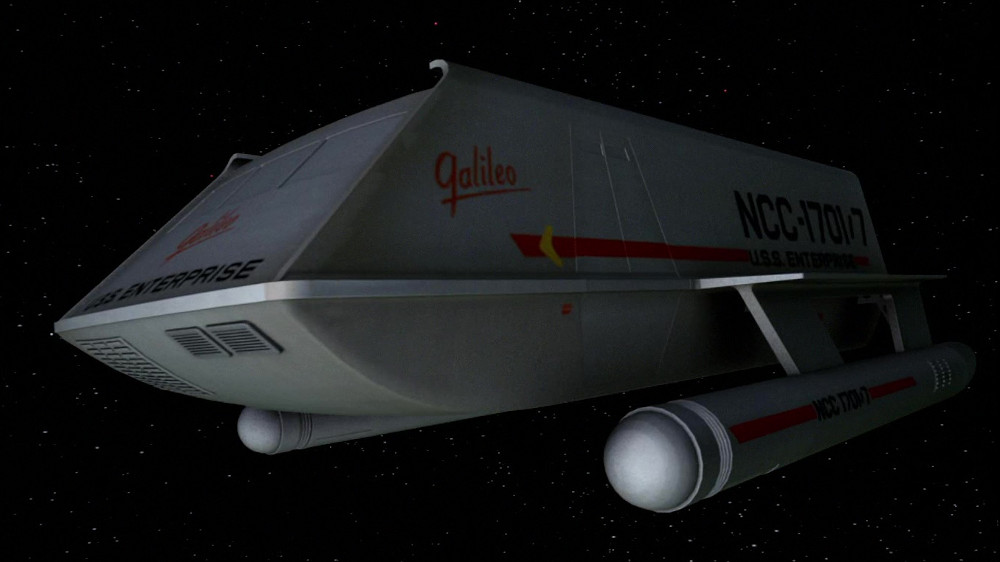Difference between revisions of "Shuttlecraft Galileo NCC-1701/7"
m |
m |
||
| Line 10: | Line 10: | ||
{{banner|Prime}} | {{banner|Prime}} | ||
The Shuttlecraft ''Galileo'' was a {{link|Prime|Class F shuttlecraft}},<ref name="TOS16A"/> named for the {{link|Prime|Humans||Human}} {{link|Prime|astronomer}} {{link|Prime|Galileo Galilei}}. The ''Galileo'' crashed on {{link|Prime|Taurus II}} during a mission to investigate the {{link|Prime|Murasaki 312}} {{link|Prime|quasar}}-like phenomenon on {{link|Prime|Stardate}} {{link|Prime|2267|SD2821|2821.5}}. Although {{link|Prime|Starfleet Commander||Commander}} {{link|Prime|Spock}} and {{link|Prime|Starfleet Lieutenant Commander||Lieutenant Commander}} {{link|Prime|Montgomery Scott||Scott}} were able to get the shuttle back into {{link|Prime|orbit}}, there was insufficient fuel and the orbit began to decay. In a last-ditch effort to attract the attention of search parties, Spock ignited the shuttle's remaining fuel. The surviving crew members were {{link|Prime|transporter||beamed}} away just as the shuttle began to break up during re-entry into the Taurean {{link|Prime|atmosphere}}.<ref name="TOS14"/> The ''Galileo'' was succeeded by another shuttlecraft with the same name and registry, the {{link|Prime|Shuttlecraft Galileo II NCC-1701/7||Shuttlecraft ''Galileo'' II NCC-1701/7}}.<ref name="TOS31"/> | The Shuttlecraft ''Galileo'' was a {{link|Prime|Class F shuttlecraft}},<ref name="TOS16A"/> named for the {{link|Prime|Humans||Human}} {{link|Prime|astronomer}} {{link|Prime|Galileo Galilei}}. The ''Galileo'' crashed on {{link|Prime|Taurus II}} during a mission to investigate the {{link|Prime|Murasaki 312}} {{link|Prime|quasar}}-like phenomenon on {{link|Prime|Stardate}} {{link|Prime|2267|SD2821|2821.5}}. Although {{link|Prime|Starfleet Commander||Commander}} {{link|Prime|Spock}} and {{link|Prime|Starfleet Lieutenant Commander||Lieutenant Commander}} {{link|Prime|Montgomery Scott||Scott}} were able to get the shuttle back into {{link|Prime|orbit}}, there was insufficient fuel and the orbit began to decay. In a last-ditch effort to attract the attention of search parties, Spock ignited the shuttle's remaining fuel. The surviving crew members were {{link|Prime|transporter||beamed}} away just as the shuttle began to break up during re-entry into the Taurean {{link|Prime|atmosphere}}.<ref name="TOS14"/> The ''Galileo'' was succeeded by another shuttlecraft with the same name and registry, the {{link|Prime|Shuttlecraft Galileo II NCC-1701/7||Shuttlecraft ''Galileo'' II NCC-1701/7}}.<ref name="TOS31"/> | ||
| + | {{ShipsGalileo|width=60%}} | ||
| + | {{ClassFShuttles}} | ||
{{References}} | {{References}} | ||
<references> | <references> | ||
Revision as of 19:48, 2 October 2023
| Registry | NCC-1701/7 |
| Class | F |
| Parent Vessel | U.S.S. Enterprise NCC-1701 |
| Status | Destroyed: SD 2823.8 |
| First Appearance | TOS14 (5 Jan 1967) |
| Advertising |
The Shuttlecraft Galileo was a Class F shuttlecraft,[1] named for the Human astronomer Galileo Galilei. The Galileo crashed on Taurus II during a mission to investigate the Murasaki 312 quasar-like phenomenon on Stardate 2821.5. Although Commander Spock and Lieutenant Commander Scott were able to get the shuttle back into orbit, there was insufficient fuel and the orbit began to decay. In a last-ditch effort to attract the attention of search parties, Spock ignited the shuttle's remaining fuel. The surviving crew members were beamed away just as the shuttle began to break up during re-entry into the Taurean atmosphere.[2] The Galileo was succeeded by another shuttlecraft with the same name and registry, the Shuttlecraft Galileo II NCC-1701/7.[3]
Ships Named Galileo
Shuttlecraft Galileo NCC-1701/7 (Type-F Shuttlecraft) • Shuttlecraft Galileo II NCC-1701/7 (Type-F Shuttlecraft) • Shuttlecraft Galileo NCC-1701-A/5 (Type-G Shuttlecraft)
FASA Timeline
U.N.S.S. Galileo (Galileo class) • U.S.S. Galilei NCC-3808 (Ptolemy class) • Shuttlecraft Galileo NCC-1701/7 (Type-F Shuttlecraft) • Shuttlecraft Galileo II NCC-1701/7 (Type-F Shuttlecraft) • U.S.S. Galileo NCC-16600 (Mission class)
SFU Timeline
Shuttlecraft F class vessels
Shuttlecraft Columbus NCC-1701/2 • Shuttlecraft da Vinci SB4-0314/2 • Shuttlecraft Einstein NCC-1701/6 • Shuttlecraft Galileo NCC-1701/7 • Shuttlecraft Galileo II NCC-1701/7 • Shuttlecraft Picasso SB11-1201/1
Columbia Timeline
Shuttlecraft Columbus NCC-1701/2 • Shuttlecraft da Vinci SB4-0314/2 • Shuttlecraft Galileo NCC-1701/7 • Shuttlecraft Galileo II NCC-1701/7 • Shuttlecraft Icarus NCC-1701 • Shuttlecraft Kepler NCC-470 • Shuttlecraft Kepler NCC-1701 • Shuttlecraft McAuliffe NCC-1647 • Shuttlecraft Picasso SB11-1201/1
FASA Timeline
Shuttlecraft Columbus NCC-1701/2 • Shuttlecraft da Vinci SB4-0314/2 • Shuttlecraft Galileo NCC-1701/7 • Shuttlecraft Galileo II NCC-1701/7 • Shuttlecraft Picasso SB11-1201/1
STO Timeline
Shuttlecraft Columbus NCC-1701/2 • Shuttlecraft Copernicus NCC-1500 • Shuttlecraft da Vinci SB4-0314/2 • Shuttlecraft Galileo NCC-1701/7 • Shuttlecraft Galileo II NCC-1701/7 • Shuttlecraft Picasso SB11-1201/1
Myriad Universes
Shuttlecraft Apollo NCC-1834 • Shuttlecraft Armstrong NCC-1701 • Shuttlecraft Balboa NCC-1622
Notes and References
- ↑ Roddenberry, Gene (Executive Producer). "The Menagerie, Part I." Star Trek, Season 1, Episode 11 (Production 16). Directed by Marc Daniels and Robert Butler. Written by Gene Roddenberry. Desilu Productions, 17 November 1966.
- ↑ Roddenberry, Gene (Executive Producer). "The Galileo Seven." Star Trek, Season 1, Episode 16 (Production 14). Directed by Robert Gist. Story by Oliver Crawford Teleplay by Oliver Crawford & S. Bar-David. Desilu Productions, 5 January 1967.
- ↑ Roddenberry, Gene (Executive Producer). "Metamorphosis." Star Trek, Season 2, Episode 2. Directed by Ralph Senensky. Written by Gene L. Coon. Desilu Productions, 10 November 1967.

